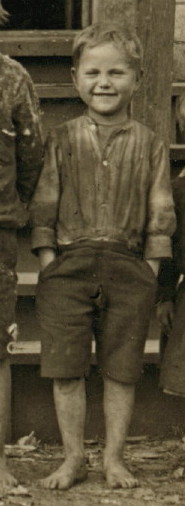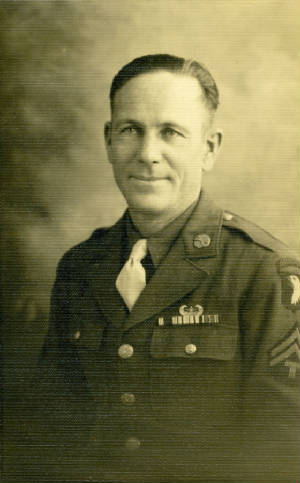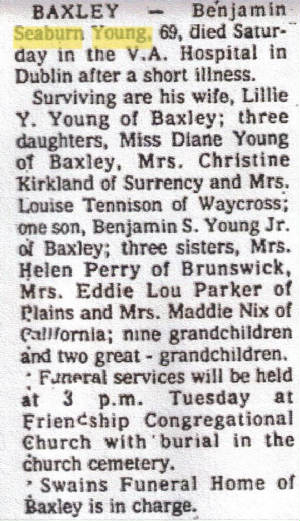
Benjamin Seaborn Young was born about 1904. He was named after Seaborn Bailey, his grandfather (Catherine’s father), and was known as Seaborn. He left the orphanage on May 15, 1911, at about the age of seven, and went to live with James Walter White and his wife Pruella (Thomas) White, who lived on a farm in Baxley, Georgia. They apparently had only one other child. Mr. White was known as Walter. Six months later, the Whites went back to the orphanage and took Seaborn’s younger brother Jesse. The census listed both children as adopted, but that is unlikely since both children continued to use Young as their last name. Nevertheless, in Mrs. White’s 1951 obituary, Seaborn and Jesse were listed as surviving sons.
Seaborn lived with the Whites until at least 1930, at which time he was working as a building contractor. As stated in Catherine Young’s story, Seaborn’s nephew, Clinton Willis (son of Seaborn’s sister Mell), said that in about 1937, “Daddy decided he was going to sharecrop. We moved to Worth County, and Uncle Jake and my grandmother (Catherine) moved out to the same farm and farmed part of it.”
After that, Seaborn lived most of his life in Baxley. He married Lillie Yawn sometime after 1942. She was a widow and already had one child, Catherine. Seaborn and Lillie had two children, Benjamin Jr. and Diane. He worked at various jobs, mostly as a carpenter. He also owned a barbeque restaurant for a while. He kept in contact with brother Jesse, visiting him at least two times.
He died on September 14, 1974, at the age of 69. In his obituary, his surviving siblings were listed as Eddie Lou, Mattie (incorrectly spelled as Maddie); and Helen Perry, who was the adopted daughter of Mr. and Mrs. White. The only other surviving sibling was Elizabeth, but she was not listed. His wife Lillie died in 1990, at the age of 79.
I interviewed his stepdaughter, Catherine Kirkland; Catherine’s daughter, Claudie Suggs; and Seaborn’s granddaughter, Clara Spell.
Excerpts from my interview with Catherine Kirkland, stepdaughter of Seaborn Young. Interview conducted on March 25, 2011.
“I was born in 1942. My real daddy had died, and my mother married my stepdaddy. They had a boy and a girl, Benjamin Seaborn Jr, and Diane. They’re both deceased now. We lived in Baxley. My stepfather — I called him my daddy — was a carpenter. He also used to have a little barbeque place next door to our house. It was called Young’s Barbeque. He didn’t do too well at it. Business was real slow, so he finally closed it down and made it into a house.”
“He was a good guy. He was a hard worker. He always had something to do. When he got where he couldn’t work, he would sit on the side of the road and sell fruit, and he would sit on the porch and sharpen saws for people. He didn’t make much. He always sat and read the Bible to us. He was in good health until he got TB once and had to go to the TB hospital. He stayed there for about 18 months. But he got better and came back home.”
Catherine Kirkland passed away on September 21, 2011.
**************************
Excerpts from interview with Clara Spell, granddaughter of Seaborn Young (and daughter of Seaborn’s daughter, Diane Young). Interview conducted by Joe Manning on April 2, 2011.
“I was shocked and excited when I saw the picture you sent me. I just couldn’t believe it. I was six years old when he passed away. So to see a picture of him as a child; I just can’t tell you how that made me feel.”
“My granddaddy was a really good man. He’d read the Bible to us every single night from 7 to 8:00. He had this chair that he always sat in. If we even made a sound while he was reading, he would get a little upset. He used to make ice cream for all of us kids, and that is still a precious memory.”
“There was one time when he was a drinker. I heard that he must have done it around the kids. They used to play around and fill his liquor bottles with water and run around and bump into stuff and act like they were drunk. He told Grandma to take those bottles away from the kids, and Grandma told him no, that if he wanted them taken away, he better do it himself. Grandma said that after he took the bottles away, he never touched another drop the rest of his life. That shows that he had a lot of character, and a lot of heart.”
“I had a pet rooster when I was little. Anytime I was outside playing and that rooster would hear me cry, he would go and attack anybody that was around. I was told that one time, I was in the house, and somebody had made me cry because I didn’t want to take a nap, and that rooster was at the window trying to get inside to protect me. And I was told that there was one time when I was outside, and I guess I was doing something I wasn’t supposed to, and Granddaddy shouted at me and made me cry. That rooster got hold of him, and Granddaddy done rung his neck.”
**************************
Excerpts from my interview with Claudie Suggs, step-granddaughter of Seaborn Young. Interview conducted March 24, 2011.
“I was born in 1961. I lived with my step-grandfather — I called him my grandfather — in Baxley. We all lived together, my mom and all of us. My dad wasn’t around, so we lived with my grandparents. It was kind of a small house. It had two bedrooms. My grandfather owned a restaurant right next to it on the same property. It was a barbeque place. He ran that for a few years. He and my grandmother and his children worked there. Us little kids, we’d run around there and sort of help out.”
“He was also a saw filer. He would sit on the front porch and file them. People would bring their saws for miles around. I can’t remember how much he charged, but I know it wasn’t very much, like maybe a quarter. Sometimes they would pay him with vegetables, which he didn’t really need because he had his own garden. He’d get up before the sun came up and be out there doing the hoeing. He plowed it by hand. I never realized how hard that was until one year, I decided I wanted to have me a garden. I wanted it to be just like my granddaddy’s garden. I was going to do it all by hand. When I got through with that, I had more appreciation for my grandfather and for all the hard work he went through.”
“After he closed the restaurant, he made the restaurant into a house, so we had two houses, side by side. We had what we called the old house and the new house, which had been the restaurant. In the old house, we didn’t have an indoor bathroom, we had an outhouse. We had indoor plumbing in the new house. The kids and my mother usually slept over in the old house, and so would my Uncle Benny, my grandfather’s son. Most of the grownups would stay over at the other house. We had a lot of people living there. We had my mom and her five kids, my aunt and her two kids, and my grandmother and grandfather and Benny.”
“He was always working, so he didn’t play with us much. But he had some big old pigs, and he’d ride us on them. Every night he would make us sit down. He turned off the TV, and he’d read the Bible. You had to be very, very quiet when he read that Bible. If he ever looked up at you, you’d know that you was in trouble once he closed it. He loved God. When he wasn’t able to go to church, he’d pray with the TV. He was like one of the greatest men I ever knew. Everything he did impressed me. He had a lot of friends. Even when he passed away, his friends would come and bring my grandmother vegetables and stuff.”
“We didn’t know anything about my grandfather’s childhood. It will be interesting now to know how he grew up, and learn about his family and everything.”

